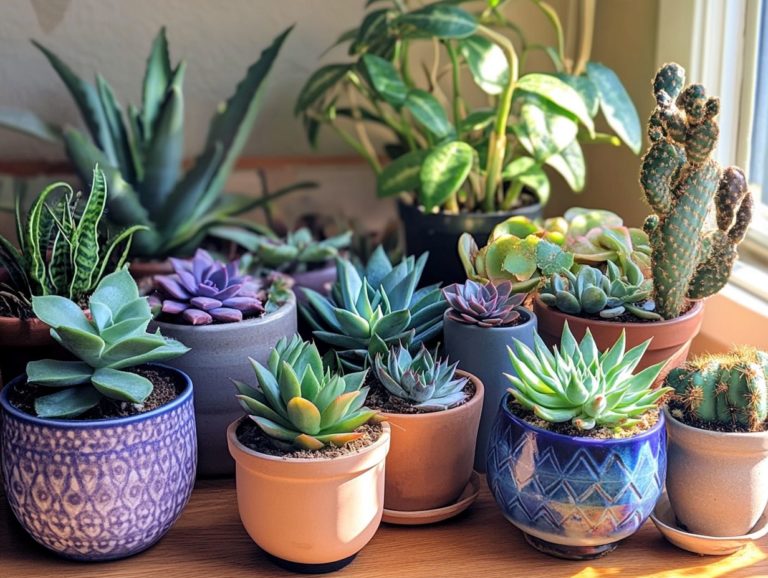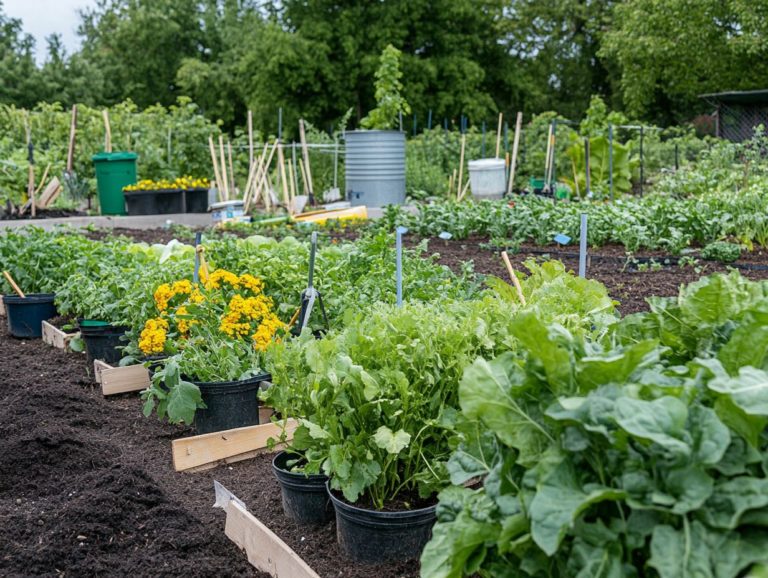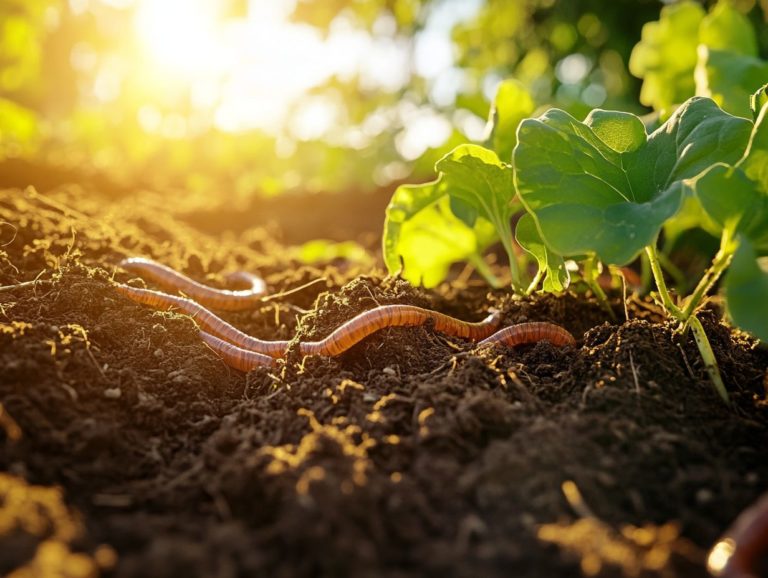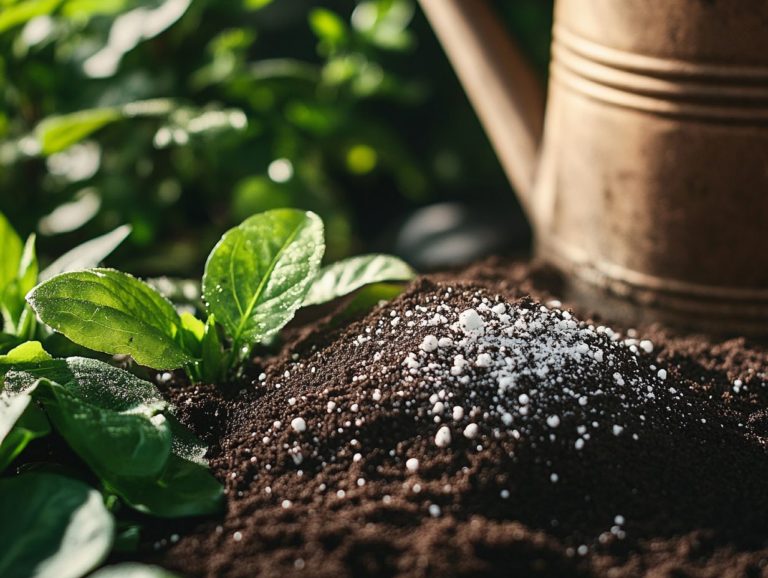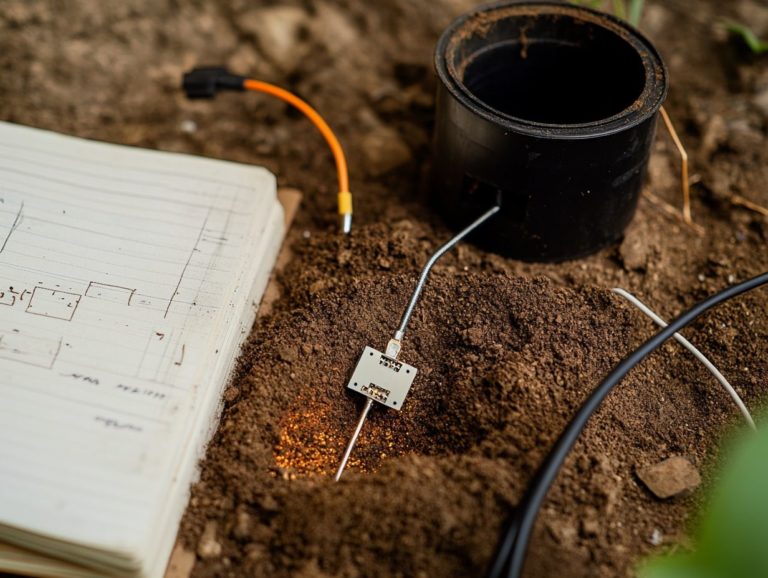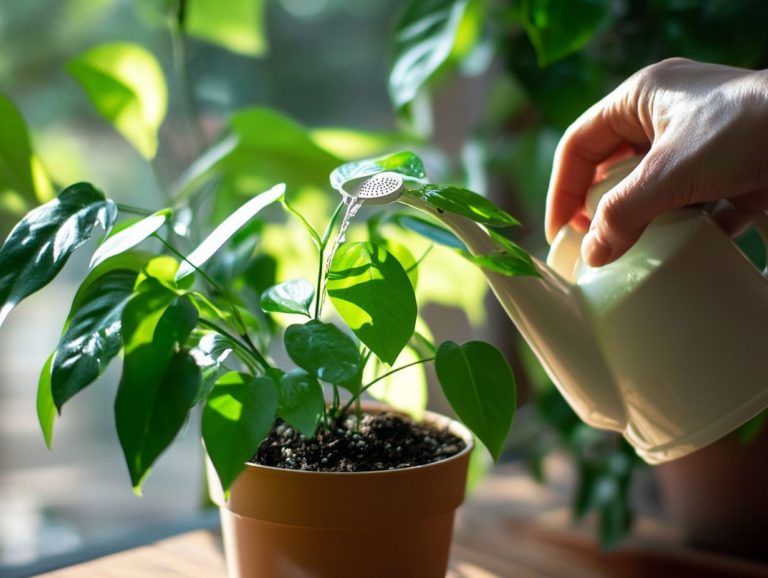Essential Soil Components for Indoor Plants
Soil is not merely a support system for your indoor plants; it s a vibrant ecosystem that nurtures their growth and vitality.
Grasping the essential components of soil, including both macro and micro nutrients, is crucial to fostering thriving plants.
This article delves into the significance of these nutrients, the role of organic matter, and provides guidance on selecting and maintaining the ideal soil for your indoor garden.
Whether you re a seasoned plant parent or just starting out, these insights will empower you to cultivate a lush, healthy indoor oasis.
Contents
- Key Takeaways:
- Key Nutrients for Healthy Plant Growth
- Micro Nutrients for Optimal Plant Health
- Organic Matter and its Role in Soil
- Choosing the Right Soil for Indoor Plants
- Tips for Maintaining Healthy Soil
- Frequently Asked Questions
- What are the essential soil components for indoor plants?
- Why is organic matter important for indoor plants?
- What minerals should be present in the soil for indoor plants?
- How does air affect indoor plant growth?
- What role do microorganisms play in soil for indoor plants?
- Why is pH balance important for indoor plants?
Key Takeaways:
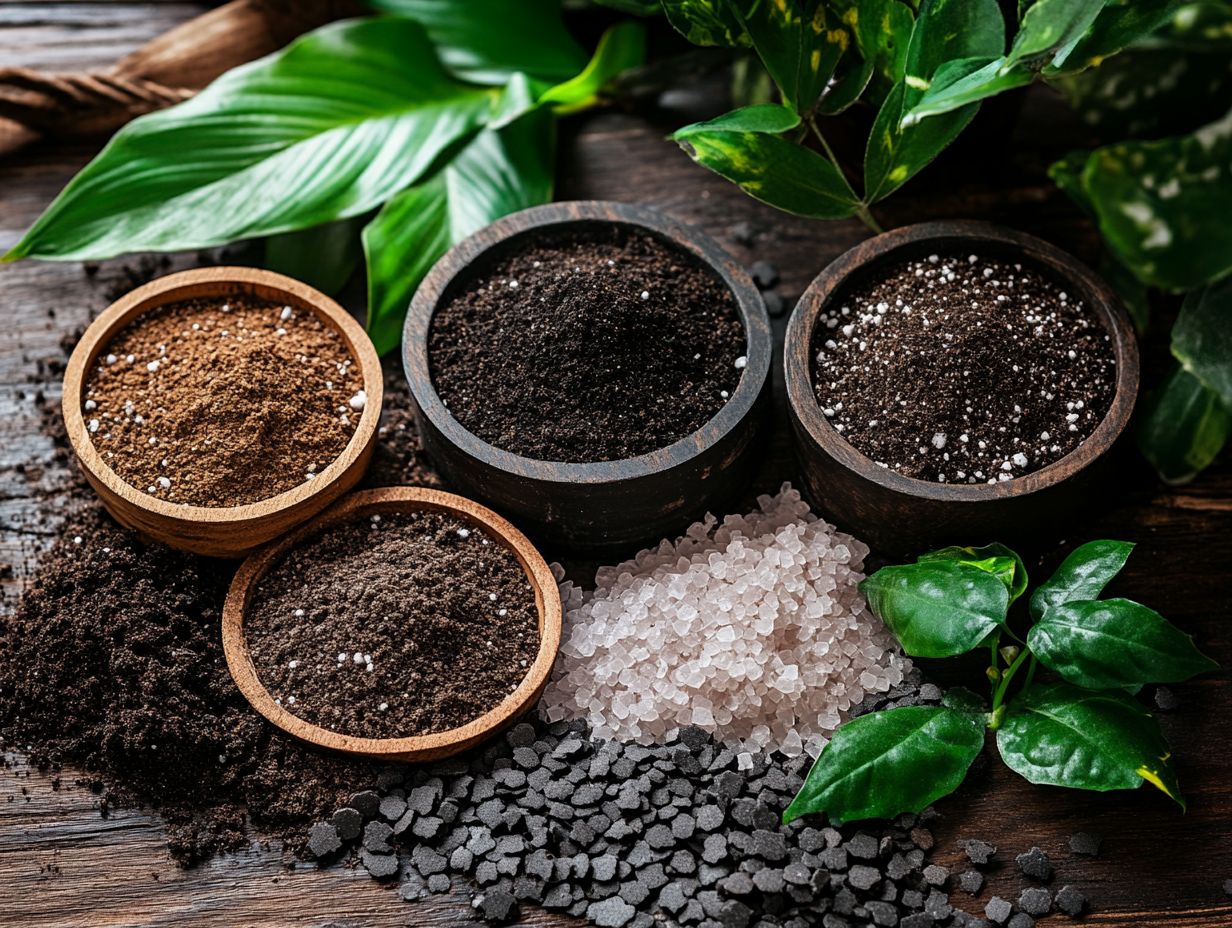
- Proper soil composition is crucial for the health and growth of indoor plants.
- Key nutrients, including nitrogen, phosphorus, and potassium, are essential for healthy plant growth.
- Choosing the right soil and maintaining it through proper watering and fertilization techniques can ensure optimal plant health.
Why Soil is Important for Indoor Plants
Soil serves as the lifeblood of your indoor plants, acting not only as a reservoir for essential nutrients but also providing the sturdy foundation that roots need to flourish.
The ideal soil for indoor plants enhances moisture retention while ensuring proper aeration and drainage key elements in preventing dreaded issues like root rot.
Understanding soil pH and composition guides your choice of potting mix, such as opting for a cactus mix or a succulent mix tailored to the unique needs of your plants.
Choosing the right soil is essential for your plants to thrive don t underestimate its importance!
Each indoor plant has its own preferences and thrives in specific soil characteristics. For example, moisture-loving species like ferns thrive in a potting medium that retains water, while desert plants prefer a gritty blend that drains quickly.
Overlooking these requirements can lead to health complications, such as fungal infections or nutrient deficiencies, ultimately stunting their growth.
Choosing the right potting medium is key to meeting your indoor garden s moisture and nutrient needs. It creates the vibrant environment your plants crave.
Key Nutrients for Healthy Plant Growth
Key nutrients are vital for the healthy growth of your indoor plants, providing the essential building blocks necessary for robust development and vitality.
Nitrogen, phosphorus, and potassium are the three primary nutrients that significantly influence plant health, affecting everything from leaf development to flowering.
By thoughtfully incorporating these nutrients into your potting mix or organic potting solutions, you can elevate your plants’ overall well-being and ensure flourishing growth.
Nitrogen, Phosphorus, and Potassium
Nitrogen, phosphorus, and potassium form the essential trio of key nutrients critical for the healthy growth of your indoor plants. Nitrogen encourages lush, green foliage, phosphorus bolsters root development and flowering, and potassium enhances overall plant resilience and health.
To ensure your indoor plants flourish, it’s vital to keep a close eye on the soil s nutrient content and make adjustments as needed.
You can start identifying nutrient deficiencies by observing the symptoms your plants exhibit. Yellowing leaves, stunted growth, or lackluster flowering can indicate an imbalance in nutrients.
For optimal nourishment, consider various sources for these key nutrients options like compost, fish emulsion, or specialized fertilizers tailored for indoor plants.
The ideal ratios of these nutrients will vary depending on the types of plants you re caring for. For instance, leafy greens typically thrive with a higher nitrogen ratio, while flowering plants benefit from increased phosphorus.
Ultimately, creating nutrient-rich soil not only supports effective growth but also cultivates vibrant, resilient plants that truly thrive in your indoor environment.
Micro Nutrients for Optimal Plant Health
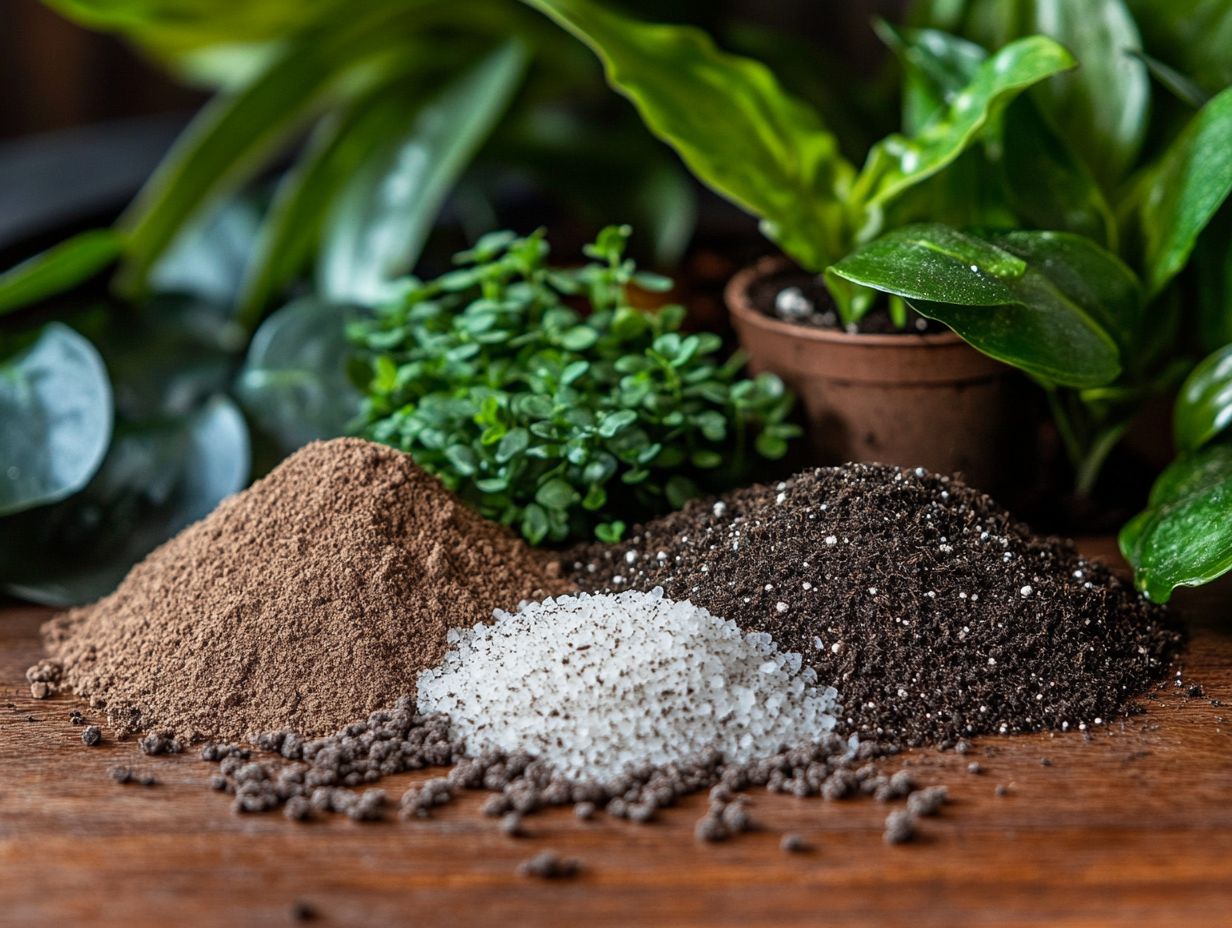
Micro nutrients are vital for optimal plant health, even though they are needed in smaller amounts. They play a significant role in overall growth and development.
Key micro nutrients include calcium, magnesium, and sulfur. These are essential for physiological functions like enzyme activity and chlorophyll production.
Including these nutrients in your potting mix is fundamental for nurturing healthy plants indoors.
Calcium, Magnesium, and Sulfur
Calcium stabilizes cell walls. Magnesium is crucial for making chlorophyll, while sulfur helps in forming proteins!
To incorporate these nutrients into your soil, consider using crushed eggshells or agricultural lime for calcium. You can introduce magnesium with Epsom salts (a magnesium sulfate compound), while gypsum (calcium sulfate) is an excellent source of sulfur.
Recognizing signs of deficiency is equally important. If you see stunted growth or yellowing leaves, your plants may be lacking these vital nutrients. A balanced supply can promote robust growth and vibrant foliage, enhancing resistance against pests and diseases.
Organic Matter and its Role in Soil
Organic matter is essential for improving soil quality, especially in potting soil. It enhances moisture retention, boosts nutrient availability, and improves soil structure.
By incorporating organic amendments like compost or earthworm castings, you create a thriving ecosystem that greatly benefits your plants. This promotes strong root growth and helps prevent common health issues, ensuring your indoor garden flourishes.
Benefits of Adding Organic Matter to Soil
Adding organic matter unlocks numerous benefits, such as improved moisture retention and enhanced nutrient availability both crucial for nurturing healthier plants. Using organic amendments like compost and coconut coir boosts your soil s ability to retain moisture while supplying essential nutrients.
Organic matter also improves soil texture. It breaks up compacted layers, allowing roots to delve deeper for water and nutrients.
Furthermore, organic matter creates a vibrant ecosystem that attracts beneficial microbes and earthworms. These organisms naturally aerate the soil and enhance its fertility by breaking down organic material, releasing essential nutrients gradually. This reduces your reliance on synthetic fertilizers.
Integrating organic matter not only addresses compacted soil issues but also cultivates a more resilient and productive growing environment!
Choosing the Right Soil for Indoor Plants
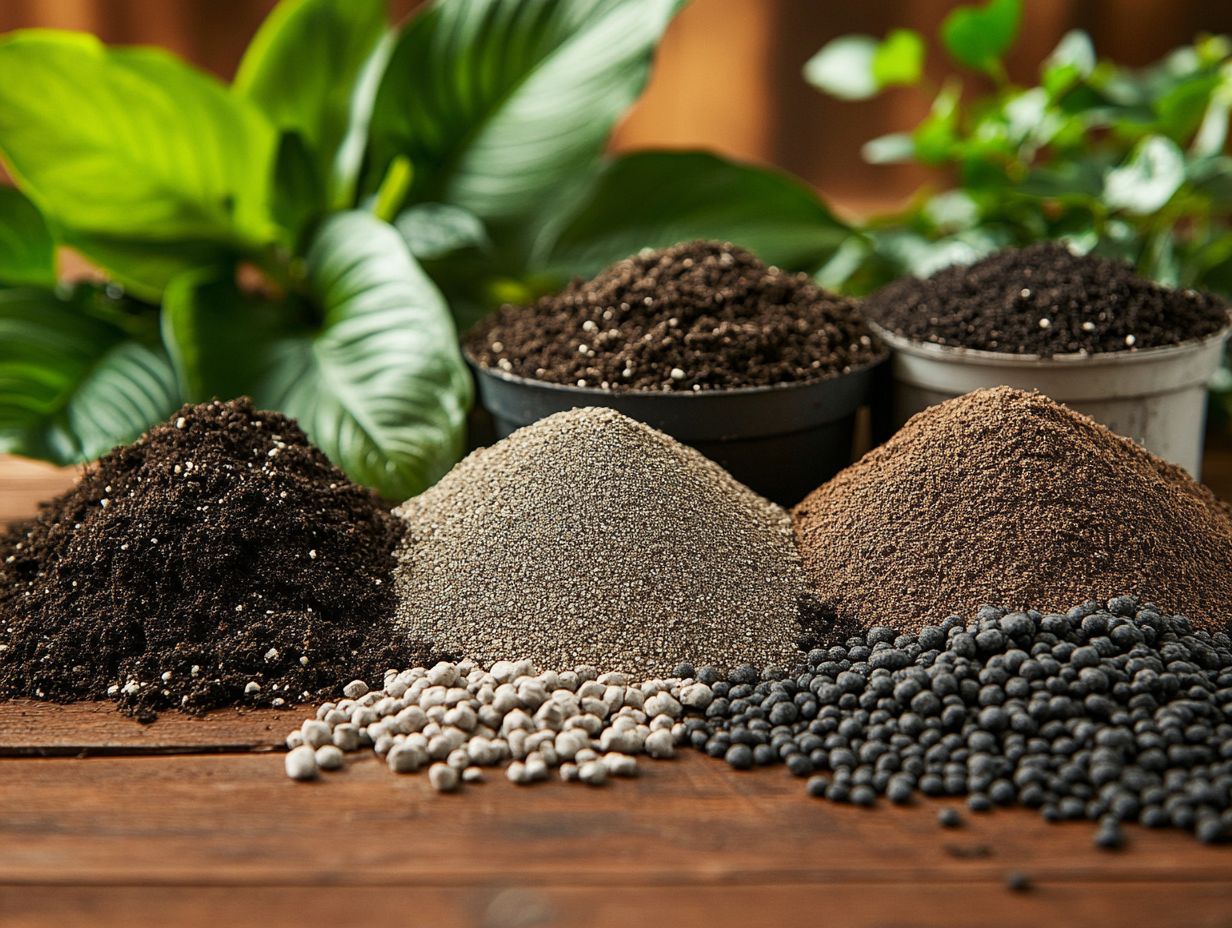
Choosing the right soil for your indoor plants is crucial for their growth and well-being. Each plant type has its own specific soil needs that align with its preferences.
Whether you choose a lightweight potting mix enriched with perlite (a lightweight material that improves air circulation in the soil) or a specialized cactus and succulent mix designed for optimal drainage, understanding these options can greatly elevate the vitality of your plants! Additionally, knowing how to test soil quality for indoor plants can further enhance their health.
Different Types of Soil and their Uses
Different types of soil serve distinct purposes, and selecting the right mix is essential for the success of your indoor plants.
A well-suited potting mix typically includes a blend of peat moss, bark, and vermiculite, creating a balanced environment for most houseplants. This combination not only promotes moisture retention but also ensures adequate aeration, or the movement of air through soil, which is crucial for root development and nutrient accessibility. Additionally, understanding soil pH for indoor plants can further enhance plant growth.
On the other hand, cactus and succulent mixes are specially formulated for those drought-resistant varieties, allowing excess water to drain away swiftly to prevent root rot.
Dive into the unique characteristics of each soil type now! It s your key to thriving plants. By understanding these characteristics, you can optimize your planting strategies, enhance drainage, and ultimately support healthier, thriving plants.
Tips for Maintaining Healthy Soil
Healthy soil is the secret sauce for thriving indoor plants! Keep an eye on soil conditions and care for them well. It requires you to regularly monitor soil conditions and implement best practices, like learning how to water correctly and thoughtful fertilization.
Understand how to maintain optimal moisture levels to keep your plants healthy. By conducting periodic soil tests, you can make informed decisions about amendments and care practices, ensuring your plants thrive beautifully.
Proper Watering and Fertilization Techniques
Proper watering and fertilization techniques are essential for ensuring your indoor plants receive the necessary moisture and nutrients. Establishing a consistent watering schedule while considering factors like soil conditions and soil types will help you avoid issues such as waterlogged soil or root rot.
Paying attention to your plant s leaves can offer important clues about its hydration status; if you notice yellowing or drooping, it often signals over-watering, while browning tips might indicate the opposite.
Different types of plants have their own unique fertilization needs. For instance, flowering plants flourish with higher phosphorus levels, while leafy greens benefit from nitrogen-rich formulas. Regularly evaluating these requirements will not only support vibrant growth but also strengthen your plants against pests and diseases.
Embracing these best practices in your everyday plant care is key to cultivating a thriving indoor garden and happy plants.
Frequently Asked Questions
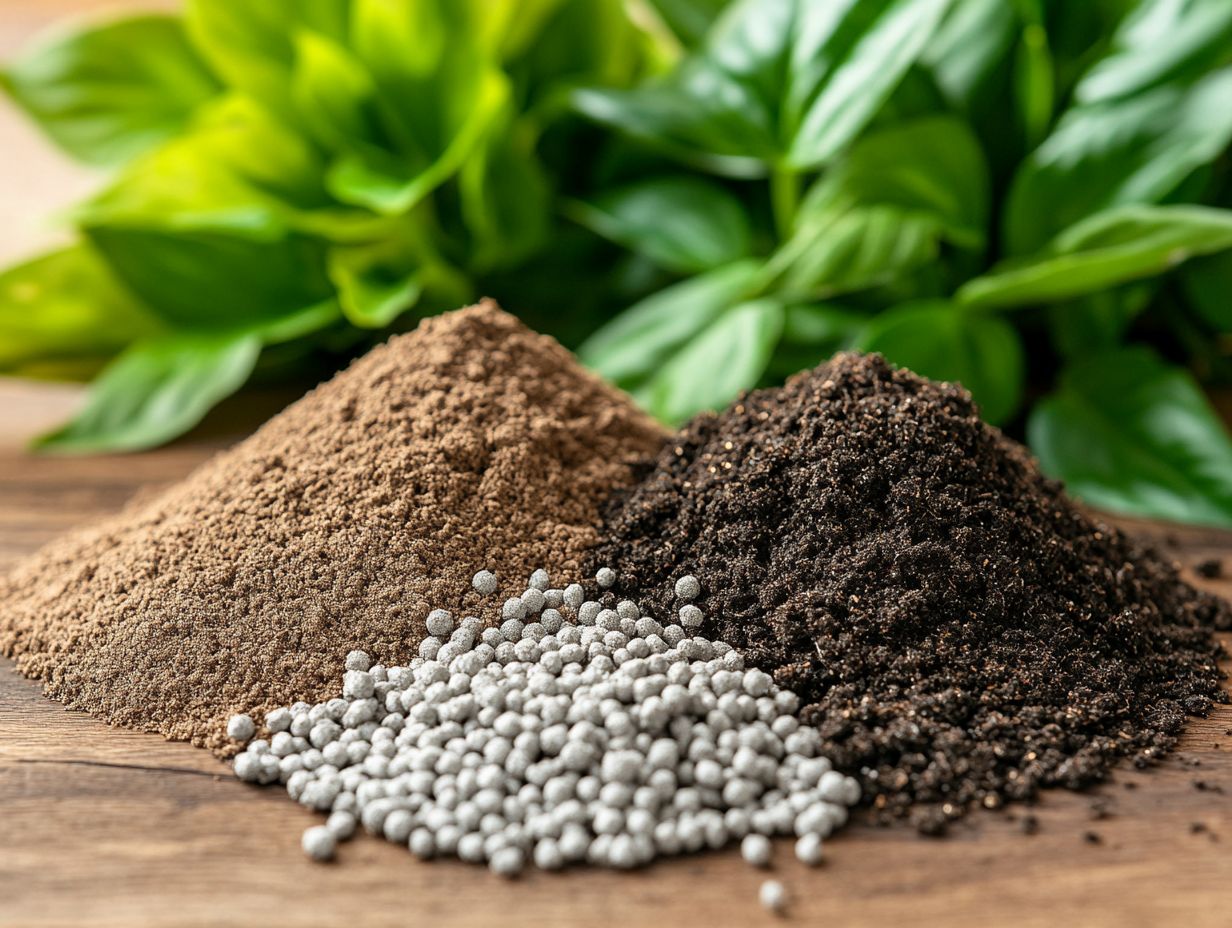
What are the essential soil components for indoor plants?
The essential soil components for indoor plants include organic matter, minerals, water, microorganisms, and pH balance. Airflow is also important for indoor plants because it allows for proper root respiration.
Why is organic matter important for indoor plants?
Organic matter provides necessary nutrients for indoor plants to grow healthy and strong. It also helps improve soil structure and water retention.
What minerals should be present in the soil for indoor plants?
Indoor plants require a balance of macronutrients such as nitrogen, phosphorus, and potassium, as well as micronutrients like calcium, magnesium, and iron.
How does air affect indoor plant growth?
Air is important for indoor plants as it allows for proper root respiration and prevents the soil from becoming compacted, which can hinder plant growth.
What role do microorganisms play in soil for indoor plants?
Microorganisms in the soil help break down organic matter into smaller forms that are easier for plants to absorb. They also play a key role in maintaining soil health.
Why is pH balance important for indoor plants?
Indoor plants have specific pH preferences for optimal growth. Maintaining the proper pH balance in soil ensures that plants can absorb nutrients efficiently.

